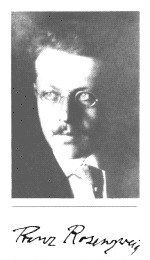 The second is Franz Rosenzweig. (Rushkoff lists The Star of Redemption
in his bibliography, but it's one of those books that people cite but never read
and certainly don't understand, nor is it at all discussed in the book.). Rosenzweig was the prophet of the last most-promising attempt at Jewish renaissance, which took place in Weimar Germany and featured such luminaries as Buber, Scholem, and, peripherally, Benjamin and Kafka. Rosenzweig made two contributions that Rushkoff unknowingly attempts to reinvent: the first is an almost postmodern approach to Torah that argues for self-consciously embracing the code while being fully cognizant of its virtual nature. Rosenzweig argues that belief in the 'truth-claims' of Torah is not essential to Judaism and never really has been; what matters instead is Jewish practice (halakhah) and intellectual engagement
with the texts of Judaism, the code. This is close
to what Rushkoff argues, but Rosenzweig's commitment to
the code translates into a more thoughtful understanding
of learning and the possibilities for the "lapsed" Jew to
return to Judaism. Rosenzweig founded a visionary adult education school, the Frankurt Lehrhaus, and wrote moving essays on Jewish education that argue for the beauty and
authenticity of the "lapsed" Jew's engagement with
Jewish text. Rosenzweig's writing, combined with the story
of his own personal return, is profound and inspiring.
The second is Franz Rosenzweig. (Rushkoff lists The Star of Redemption
in his bibliography, but it's one of those books that people cite but never read
and certainly don't understand, nor is it at all discussed in the book.). Rosenzweig was the prophet of the last most-promising attempt at Jewish renaissance, which took place in Weimar Germany and featured such luminaries as Buber, Scholem, and, peripherally, Benjamin and Kafka. Rosenzweig made two contributions that Rushkoff unknowingly attempts to reinvent: the first is an almost postmodern approach to Torah that argues for self-consciously embracing the code while being fully cognizant of its virtual nature. Rosenzweig argues that belief in the 'truth-claims' of Torah is not essential to Judaism and never really has been; what matters instead is Jewish practice (halakhah) and intellectual engagement
with the texts of Judaism, the code. This is close
to what Rushkoff argues, but Rosenzweig's commitment to
the code translates into a more thoughtful understanding
of learning and the possibilities for the "lapsed" Jew to
return to Judaism. Rosenzweig founded a visionary adult education school, the Frankurt Lehrhaus, and wrote moving essays on Jewish education that argue for the beauty and
authenticity of the "lapsed" Jew's engagement with
Jewish text. Rosenzweig's writing, combined with the story
of his own personal return, is profound and inspiring.
Lastly, I wish to add to this list Arnie Eisen, who brings Kaplan and Rosenzweig into contemporary America. Two of Eisen's works in particular, Rethinking Modern Judaism and Taking Hold of Torah, feature fully articulated versions of what Rushkoff can only hint at. The first book is a historical and academic assessment of Judaism and Jewish practice that, drawing from Kaplan and Rosenzweig, establishes the possibility of a post-modern commitment to the religion through learning and ritual practice. The second is a more popular version of the first. It communicates the same ideas in a more personal and much more accessible format. What both books do is establish the basis for the sort of renaissance urged by Rushkoff. However they found a more viable model derived from a thorough study of Judaism and Jewish history rather than shoddy scholarship and wishful thinking.
Perhaps the best that can be said about Nothing Sacred is that it is provoking a meaningful and welcome debate about Judaism, and to that extent Rushkoff has already succeeded in changing the agenda from Israel and intermarriage to Torah. If he can get the people running American Jewry's major institution and philanthropies actually to challenge their assumptions, he will have done us all a great favor. Certainly, the people Rushkoff debates in this book, the very people he hopes will be his audience, all seem incredibly stupid, and I appreciate that Rushkoff is trying to bash some sense into them. Having gotten everyone's attention, however, Rushkoff ultimately does not have a whole lot to say, and what he does say, others have already said better: Torah is an open book, and doing Judaism right means learning to read it, understand it, wrestle with it, and live in it. Judaism, moreover, is worth the effort. So go and learn.

The soft borders between Jewish particularism and universalism
February, 2003
Arte Povera, Damien Hirst, and annoying pomo intellectualism
December, 2002
What draws protesters to banal holocaust art?
April, 2002
May Tricks: Reel-or-Dead?
June, 2003
Hypercapitalism as Satanism
June, 2003
Is Zionism Colonialism?
June, 2003
Four modern Orthodox breakbeat musicians on Jewish art
May, 2003
Jewish sex radicalism in the New World Order
May, 2003
Ali G.: The Poseur's Poseur
April, 2003
Am I an environmentalist for the same reasons I don't like to spend money?
April, 2002



Symposium on
Douglas Rushkoff's
Nothing Sacred:
The Sacred and the Profane
A Conversation with Douglas Rushkoff
Reinventing the Wheel: A Review of Nothing Sacred
Michael Shurkin
They Gonna Crucify Me: A 'Lapsed Jew' Responds to Nothing Sacred
Ken Applebaum
Plus these other attractions:
Meditation and Sensuality
Jay Michaelson
Anything You Want to Be
Ben Cohen
Not Mentioned
Hal Sirowitz
Josh Graduates High School
Josh Ring
Zeek in Print
Spring 03 issue available here
Saddies
David Stromberg
about zeek
archive
links